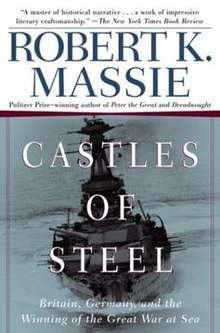Castles of Steel
Castles of Steel: Britain, Germany, and the Winning of the Great War at Sea is a work of non-fiction by Pulitzer Prize-winner Robert K. Massie. It narrates the major naval actions of the First World War with an emphasis on those of the United Kingdom and Imperial Germany. The term "castles of steel" was coined by the British First Lord of the Admiralty Winston Churchill in reference to the large number of the Royal Navy's battleships he saw at Spithead in 1914.[1]
 | |
| Author | Robert K. Massie |
|---|---|
| Country | England |
| Language | English |
| Genre | Non-fiction |
| Publisher | Ballantine Books |
Publication date | 2003 |
| Media type | |
| Pages | 880 pp |
| ISBN | 978-0679456711 |
| OCLC | 57134223 |
| Preceded by | Dreadnought: Britain, Germany, and the Coming of the Great War |
Summary
The book begins in the lead-up to the declaration of hostilities between Germany and Britain, whereas Massie's previous work Dreadnought: Britain, Germany, and the coming of the Great War ended with the beginning of the war. All the significant naval strategies and battles of World War I are covered, including the Battle of Coronel, where a German squadron led by Admiral Maximilian von Spee destroyed a weaker British cruiser squadron under the command of Admiral Sir Christopher Cradock; the ensuing Battle of the Falkland Islands where von Spee's force was annihilated by a superior British squadron; the Battle of Dogger Bank (1915); Naval operations in the Dardanelles Campaign; and a detailed multichapter narrative of the Battle of Jutland and its aftermath.
Other chapters describe German submarine warfare and events triggering America's entry into the war. There are also chapters dedicated to central personalities such as British Admirals John Jellicoe and David Beatty and the German Admirals Franz von Hipper and Reinhard Scheer. The book ends with an account of the scuttling of the German High Seas Fleet in Scapa Flow.
Reception
The book was reviewed by historian Ben Pimlott in The Guardian,[2] historian Gary Sheffield in The Independent,[3] historian Max Boot in The New York Times,[4] The New Yorker,[5] and Publishers Weekly.[6]
Editions
- Massie, Robert Kinloch (2003). Castles of Steel: Britain Germany, and the Winning of the Great War at Sea. New York: Ballantine Books. ISBN 0-345-40878-0.
References
- Churchill, Winston Spencer (1923). The World Crisis. Volume I. London: Thomas Butterworth. pp. 212–213.
- Ben Pimlott (23 January 2004). "Navy Blues". The Guardian. Retrieved 19 August 2018.
- Gary Sheffield (20 February 2004). "Castles of Steel by Robert K Massie". The Independent. Retrieved 19 August 2018.
- Max Boot (23 November 2003). "What the Dreadnoughts Did". The New York Times. Retrieved 19 August 2018.
- "Castles of Steel". The New Yorker. 1 March 2004. Retrieved 19 August 2018.
- "Castles of Steel". Publishers Weekly. October 2003. Retrieved 19 August 2018.
External links
- 'Castles of Steel' Explores War at Sea, interview with Massie on NPR, Weekend Edition Saturday, January 3, 2004